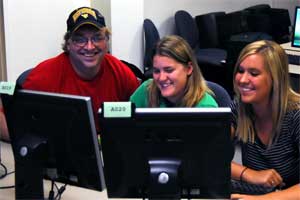MARS: Educational Benefits
Simulations are generally used as a classroom supplement to a textbook in much the same way that cases, role plays, and projects are used to illustrate the application of course content. Each alternative teaching methodology has merit. In combination, a variety of teaching methodologies can enrich and enhance the student's learning experience. Listed below are the top ten educational benefits of using a MARS Simulation as part of your course content.
Top Ten Educational Benefits
10. Students improve their problem-solving, decision-making, and analytical skills.
9. Students develop their group management skills.
8. Students apply course material in a real-world setting, making them more receptive to course content.

7. Students are exposed to a dynamic, changing environment providing them with an understanding of the necessity for adaptive behavior and corporate change.
6. Students experience the complexity of the interaction effects of sales force management decision variables.
5. Students engage in active, discovery learning.
4. Students are exposed to a competitive environment. This is an eye-opening experience for many business students.
3. Students experience the managerial aspects of a marketing or sales management career and can make more informed career choices upon graduation.
2. Students perceive increased levels of fun, excitement, and interest in the course.
1. Responsibility for learning is shifted from the professor to the student. This paradigm shift engages students in the learning process, and changes the professor's role from "sage on the stage" to that of "guide on the side". This paradigm shift results in significant learning benefits for the students, and frees professorial time for productive higher educational activities.
Published research has concluded that using a simulation can not only achieve some basic learning objectives, but also appears to have done so better than the textbook. You can find more on the simulation literature by following the "Presentations and Articles" link on the previous web page.